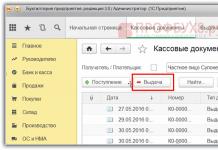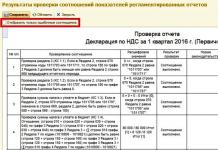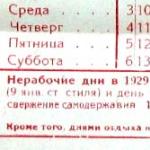Based on the results of 10 months of work, the organization discovered that it had withheld 4 rubles more from the employee and transferred personal income tax to the budget. How to correct the error so that at the end of the year everything is zero and the 2NDFL and 6NDFL are correctly linked?
If you withheld excess personal income tax during the year, count the overpayment against the tax for the current month. By the amount of the overpayment, reduce the personal income tax, which you will withhold on your next income payment. The amount of tax that was actually transferred to the budget is not reflected in the 6-NDFL calculation. But the tax office records it in the tax agent’s personal account cards. Therefore, transfer personal income tax for the current month, taking into account the overpayment.
In section 1, write down these amounts. In line 040, indicate the calculated personal income tax on all income. Enter the score you got after you fixed the error. For example, you initially mistakenly charged 150,000 rubles. Personal income tax, and then corrected for 149,000 rubles. Then in line 040 there will be 149,000 rubles.
In line 070, indicate the personal income tax that was withheld from employees. You withheld excess tax, so the figure in line 070 may be greater than in line 040.
Rationale
From Article 6-NDFL: examples for all occasions
How to fill out form 6-NDFL if the tax was transferred incorrectly
You pay personal income tax to the budget as tax agents (Article 226 of the Tax Code of the Russian Federation). Therefore, they are required to transfer to the budget exactly the amount of tax that was withheld from the employee. After all, if you pay personal income tax after the due date or not in full, tax authorities will charge penalties and fines (Article 123 of the Tax Code of the Russian Federation). And it is generally unacceptable to transfer personal income tax in advance at your own expense (clause 9 of Article 226 of the Tax Code of the Russian Federation).
However, questions from accountants showed that not everyone pays personal income tax correctly. Let's look at how to fill out the 6-NDFL report if mistakes are made. Let us remind you that in the form you reflect the amount of tax that was calculated and withheld from employees. Do not enter information about when personal income tax was actually transferred and in what amount in the form. There are no lines for this. The tax authorities will find out for themselves what amounts you paid and when when they receive your payments.
<…>
Personal income tax was overpaid to the budget
How to fill out the report depends on whether you withheld personal income tax from the employee correctly or whether there were errors.
Why personal income tax cannot be paid early
If a company transferred personal income tax to the budget before paying income to the employee, it violated the law. Indeed, in this case, the tax was paid at the expense of the employer’s own funds, and this is prohibited (clause 9 of Article 226 of the Tax Code of the Russian Federation). And tax authorities may consider that the transferred amount is not personal income tax, but money excessively transferred to the budget (letters of the Federal Tax Service of Russia dated September 29, 2014 No. BS-4-11/19714@ and dated July 25, 2014 No. BS-4-11/14507@ ). Then the company will have to return from the budget the amount transferred ahead of schedule. And the personal income tax already withheld from income must be paid again.
Tax authorities may also impose fines and penalties for non-payment of personal income tax if such an adjustment is not made (Article 75 and the Tax Code of the Russian Federation). And then the employer will have to sue. For example, a similar dispute was considered by the Arbitration Court of the Volga-Vyatka District (resolution dated February 19, 2016 in case No. A38-1604/2015). The company had to justify its right not to pay personal income tax a second time.
Considering the volume of problems that early payment of personal income tax may entail, it is better not to do this.
If you have calculated your personal income tax incorrectly, please fix the error first. Reverse the excessively accrued tax in accounting. Then make adjustments to the personal income tax register. Next, inform the employee in writing that you have withheld excess personal income tax from him (clause 1 of Article 231 of the Tax Code of the Russian Federation). Explain to the employee that he can submit a refund application to the accounting department. And if the employee writes such a statement, return the overpaid tax to his bank account.
If the employee does not want to write a statement, do not return anything to him. Simply reduce the personal income tax by the amount of the overpayment, which you will withhold on your next income payment.
In section 1, write down these amounts. In line 040, indicate the calculated personal income tax on all income. Enter the score you got after you fixed the error. For example, you initially mistakenly charged 150,000 rubles. Personal income tax, and then corrected for 149,000 rubles. Then in line 040 there will be 149,000 rubles.
In line 070, indicate the personal income tax that was withheld from employees. You withheld excess tax, so the figure in line 070 may be greater than in line 040.
If you returned the overpayment to the employee, write this amount in line 090. If you did not return anything, put a dash in line 090.
Example
Therefore, you do not have the right to offset overpaid amounts against future personal income tax accruals. So write an application to the inspectorate for a tax refund (clause 6 of Article 78 of the Tax Code of the Russian Federation and letter of the Federal Tax Service of Russia dated October 19, 2011 No. ED-3-3/3432@).
Do not reflect the overpayment in Form 6-NDFL. After all, you have calculated and withheld the correct amounts of tax. Write them down in the report in sections 1 and 2. And inspectors can find out about overpayments themselves from the budget settlement card.
Faced with overpayment of income tax and don’t know what how to return personal income tax? Let us help you figure this out. But to approach this issue, you need to understand how the final amount of income tax is formed.
Amounts subject to tax
Personal income tax (personal income tax) is a direct tax that is levied on such individuals on the territory of the Russian Federation. They are taxed on all income in the aggregate, usually in the amount of 13% of its cash or in-kind form. All people of working age, one way or another, are payers of personal income tax. For example, it is withheld from the following funds:
- from payments for sick leave;
- from salaries;
- from bonuses;
- from valuable gifts worth more than 4 thousand rubles;
- from income from the rental of real estate;
- from income from the sale of real estate;
- from fees;
- from winnings, etc.
In accordance with the Tax Code, the employer, being a tax agent, is obliged to calculate and withhold the amount of personal income tax from the employee’s wages and other income. Subsequently, these funds must go to the treasury in the form of taxes.
Tax amount
In the Russian Federation, the standard rate of this tax is 13% (in accordance with Article 224 of the Tax Code of the Russian Federation). But there are also exceptions. 15 percent will be paid by non-residents - recipients of dividends from Russian organizations. And you will have to give 35 percent to the state when you receive a win or a valuable prize (this is the maximum rate of this tax in Russia).
How to calculate
The amount of personal income tax is calculated simply: the tax rate must be multiplied by the amount of the tax base. The latter is established by law, separately for each type of income.
Who is exempt from tax
Persons who received income from:
- sale of property that they have owned for more than three years;
- inheritance of property or funds;
- receiving gifts from immediate relatives or family members;
- state benefits, payments, compensations, scholarships, state pensions and social supplements to them;
- activities of their gardens and vegetable gardens, which are located on the territory of the Russian Federation;
- receiving prizes for achievements in sports;
- assignment of maternity capital, etc.
Read also When is the deadline for submitting 3-NDFL for 2016
The full list is contained in Article 217 of the Tax Code.
Receiving deductions
Personal income tax reporting serves as the basis for receiving a tax deduction if, along with it, during the reporting period, the payer was able to provide the tax authorities or the employer with documents confirming his right to slightly reduce the amount of tax. The law allows you to reduce the tax base for personal income tax, from which 13% is usually withheld.
Who is entitled to deduction
Article 218 of the Tax Code provides a list of persons entitled to receive a standard deduction, which is not directly tied to expenses incurred, but rather related to the status of the payer. For example, this applies to people who have adopted a child, disabled people of groups I, II and WWII, liquidators of nuclear power plants and others.
In accordance with Articles 219 and 220 of the Tax Code and on their basis, you can fully or partially return the amount paid for training, for receiving medical services, for the purchase of an apartment or land, as well as funds that were previously transferred to charity.
Keep in mind: the amount of deductions cannot exceed the tax base.
Persons who are not personal income tax payers, for example, private businessmen working independently, are deprived of the right to deduction due to the fact that they have a different taxation system.
Excessively withheld personal income tax
When might it happen return of over-withheld personal income tax? For example, in the event of a tax agent’s error, in case of an accidental double payment, or if an individual was not provided with the tax deduction due to him. In both cases, an overpayment arises, which can either be returned from the budget or offset against the payment of personal income tax in the subsequent reporting period.
If there is overpayment of personal income tax, what to do– the Tax Code will help you decide.
Refund of overpaid income tax
The tax agent (employer) is obliged to notify the employee about it within ten days after discovering an error. Next, the payer must write a corresponding statement addressed to the employer, which can be drawn up by him in free form. The funds must be returned within three months or offset against future tax revenues.
Read also By September 2018, the Government will work out a new social deduction for personal income tax
In turn, the tax agent transfers the excess personal income tax withheld to the employee’s bank account independently or applies for a refund to the tax office. The deadline for filing claims for funds paid in error on taxes is 3 years.
Refund by tax agent
If the employer - tax agent does not have the funds to carry out a refund from the amounts withheld as future tax from the employee himself or other payers, as well as free personal funds, then he will be forced to apply to the Federal Tax Service. The refund procedure is regulated by Article 78 of the Tax Code.
The tax authority makes a decision on the application within 10 banking days. Moreover, the applicant may not receive his funds back if he owes taxes, penalties, fines and fees. In this case, the tax authorities will use the excess funds paid to pay off the debt, and the employer will be forced to pay the employee independently.
Collection of documents
A tax agent who wants to return overpaid personal income tax must submit the following to the tax office: documents for personal income tax return:
- employee statement;
- your statement;
- extract from the tax register;
- payment slip or receipt confirming the fact of overpayment.
Refund by the payer himself
Sometimes employees themselves apply for a refund of amounts overpaid as taxes directly to the Federal Tax Service if their claim cannot be presented to the employer (for any reason). For example, if the organization in which the person carried out his official work activity was liquidated or became bankrupt. To receive money, he will need to provide only two documents: the 3-NDFL declaration and his application.
How to find out about overpayment of tax
You can find out that there was an overpayment by looking at the 2-NDFL certificate. This information is contained in the appropriate column of this document. In turn, 2-NDFL can be obtained:
Previously, in one of the articles, we talked about solving some of the problems that tax agents have with personal income tax (see “”). Today we will take a closer look at the situation with over-withheld tax. How should an accountant act upon discovering amounts that have been excessively withheld? To whom and when should an overpayment be reported? How to properly return money to an employee? Let's figure it out.
10 days to notify
First of all, the accountant who discovered the fact of excessive withholding of personal income tax from employees must notify them about it. The Tax Code establishes a clear deadline for this, equal to 10 working days from the moment the fact of “overwithholding” is discovered. But, unfortunately, there is no established form for such notification. In our opinion, an accountant can use the sample below.
On the letterhead of the organization "Wind Rose" LLC
10.27.2014 No. 08-b/personnel Senior engineer of the BVO department
Ivanchenkova P.I.
Notice
about the fact of excess tax withholding and the amount of excess tax withheld
Dear Petr Igorevich, in accordance with paragraph 1 of the Tax Code of the Russian Federation, we inform you that on November 25, 2014, the accounting department of Wind Rose LLC identified the fact of excessive deduction from payments paid to you in September. d. income tax on personal income. The amount of excess tax withheld was 1023 (one thousand twenty three) rubles.
At the same time, we inform you that you have the right to contact the accounting department of Wind Rose LLC with an application for a refund of this amount in the manner prescribed by the Tax Code of the Russian Federation.
Director Savchenko I. S. Savchenko
Without an application - nowhere
Having sent such a notice to the employee, the employer is not required to take any further actions. Now the employee must take the initiative. He should contact the tax agent with an application for a refund of the overly withheld tax amount. The Tax Code does not establish a deadline for drawing up such an application, but it is logical to assume that it is not worth delaying more than the three years established by the Tax Code of the Russian Federation as the general period for a tax refund. Yes, probably, in practice such delays on the part of the employee do not happen.
What should be included in the application? Firstly, the full name and position of the employee, as well as the name of the organization receiving the application. The application is written addressed to the head of the organization, because It is he who acts on behalf of the tax agent in tax legal relations. Secondly, a clearly expressed desire to return the excessively withheld tax amount. Thirdly, the amount of tax to be refunded, and finally, the bank details for its transfer. Please note: personal income tax is always returned only by non-cash transfer, even if the employee receives wages (other income from which tax was excessively withheld) in cash at the cash desk.
To prevent employees from fantasizing when writing a statement, you can invite them to use a ready-made form, making it an appendix to the above notice.
To the director of LLC "Rose of the Winds" Savchenko I.S.
from a senior engineer of the BVO department
Ivanchenkova P.I.
Statement
on the return of excess tax withheld
In accordance with paragraph 1 of Art. 231 of the Tax Code of the Russian Federation, I ask you to return the excess withheld from my salary for September of this year. personal income tax in the amount of 1023 (one thousand twenty-three) rubles. Please make the return using the following details:
Bank name: Krasnodar OSB No. 8627 Sberbank of Russia
Bank location: Krasnodar
c/s 30101810300000000987
BIC 044705987
Bank INN 2193001987
account 42307.810.8.1212.4823987
Full name: Ivanchenkov Petr Igorevich
Return technique
So, a correctly completed application has been received. Now you need to transfer the money to the employee. The Tax Code of the Russian Federation allots the employer three whole months for this, indicating that the money can be taken from current personal income tax payments. Moreover, not necessarily from this specific employee - the funds for the refund can be taken from the total amount of personal income tax withheld by this tax agent. This allows you to make a refund both in situations where the employee will not receive payments in the coming months, and in cases where the amount of personal income tax to be withheld from the employee is less than the refundable amount.
Another important point for an accountant: with this tax refund option, there is no need to notify the tax office about the transaction (see letter of the Ministry of Finance of Russia dated October 18, 2013 No. 03-04-06/43608; “”). Thus, the refund algorithm is simple: the excessively withheld tax amount is withdrawn from the next payment to the budget and transferred to the account specified in the employee’s application. It is clear that all documentation for this operation must be filed and stored in case of claims from the tax authorities.
The considered option is suitable for most situations, but in practice, as they say, options are possible. Thus, small organizations may have a situation where there is no tax to pay to the budget. In this case, the Tax Code provides for a mechanism for returning personal income tax from the budget to the account of the tax agent for payment to his employee. Such a refund is carried out in accordance with the Tax Code of the Russian Federation, that is, in the same way as the refund of any other tax - at the request of the tax agent. To this application, the Tax Code of the Russian Federation requires that an extract from the tax accounting register for the corresponding tax period and documents confirming the excessive withholding and transfer of the tax amount to the budget be attached. Separately, we note that in the described case, the Tax Code of the Russian Federation allows for the possibility of compensation for the excessively withheld amount from the agent’s funds and the subsequent receipt by the agent of this amount from the budget. That is, despite the fact that the Tax Code of the Russian Federation allocates three months for the return of money to the employee (and the return of personal income tax from the budget in accordance with the Tax Code of the Russian Federation must meet these deadlines), the employer can meet the employee halfway and pay him the money earlier, without waiting for the return of personal income tax from budget.
Exceptions to the rules
As with any rule, there are also exceptions to the procedure for returning “extra” personal income tax, when the employer does not have the right to return money to the employee and the latter needs to apply for “his hard-earned money” to the tax office.
The first such exception is related to the type of overpayment. It can arise not only as a result of an error, but also due to a change in the status of the employee himself from non-resident to resident. In this case, tax recalculation and refund are carried out through the inspection (clause 1.1. Tax Code of the Russian Federation). Accordingly, the employee does not need to be notified about such “overpayments,” nor does his application for the return of such amounts need to be accepted for execution.
The second exception is related to the tax agent, or more precisely, to the absence of one. In this case, the employee must also apply for a refund to the tax office. Here you need to remember that the tax is always returned by the same agent that withheld it. This means that if an employee was transferred within a group from company to company with the subsequent liquidation of one of them, then the tax “for the liquidated” company cannot be returned.
Overpayment of personal income tax - what should a tax agent do? Errors in calculating personal income tax can lead to both failure to withhold payment and an overpaid amount. How to return an overpayment of personal income tax? We'll tell you in our material.
Overpayment of personal income tax: what to do?
According to paragraph 1 of Art. 231 of the Tax Code of the Russian Federation, personal income tax amounts excessively withheld from the taxpayer’s income must be returned by the tax agent.
Within 10 working days from the date of discovery of the overpayment, the employer is obliged to inform the employee that the amount of personal income tax was excessively withheld, as well as the amount of the amount itself (clause 6 of article 6.1, paragraph 2 of clause 1 of article 231 of the Tax Code of the Russian Federation). The message is drawn up in any form, since tax legislation does not provide for specific methods for its preparation, and is sent to the taxpayer.
A sample message about over-withheld personal income tax can be downloaded from the link below.
The procedure for sending such a message must be previously agreed with the recipient (letter of the Ministry of Finance of Russia dated May 16, 2011 No. 03-04-06/6-112, clause 1).
We are waiting for a statement from the employee
In order for the overpayment to be refunded, the taxpayer must contact the tax agent with a corresponding application in writing (clause 1 of Article 231 of the Tax Code of the Russian Federation, letter of the Ministry of Finance of Russia dated October 19, 2012 No. 03-04-05/10-1206). The deadline for filing an application is set in clause 7 of Art. 78 of the Tax Code of the Russian Federation and is 3 years from the date of payment of the tax (letter of the Federal Tax Service of Russia in Moscow dated March 19, 2010 No. 20-14/3/029018@).
In the application, the employee must indicate the details of his current or personal account, to which the employer will have to transfer funds, since the refund of the overpayment is carried out in non-cash form (paragraph 4, paragraph 1, article 231 of the Tax Code of the Russian Federation).
Example:
V.P. Smirnov is an employee of April LLC. In March 2019, he was given financial assistance in the amount of 2,000 rubles; from January to February 2019, financial assistance was not accrued or paid. The accountant mistakenly calculated and withheld personal income tax from financial assistance. The next day she discovered the error, recalculated the tax and determined the amount to be refunded. On the same day, the employee was informed about the fact of withholding and the amount of tax that the organization was obliged to return to him.
V.P. Smirnov must write a statement so that April LLC returns to him the excessively withheld amount of personal income tax.
We return the overpayment
So, the tax agent received the taxpayer’s application for a personal income tax refund. Now, within 3 months, he is obliged to return the excessively transferred amount of tax (paragraph 3, paragraph 1, article 231 of the Tax Code of the Russian Federation). If you do not do this within the period established by law, then in addition to the tax itself, the employer will have to pay the employee interest for violating the terms for the return of funds. Interest is accrued for each calendar day of delay, and the interest rate is taken equal to the refinancing rate of the Central Bank of the Russian Federation in force at that time (paragraph 5, paragraph 1, article 231 of the Tax Code of the Russian Federation). Overpayment of personal income tax in 2019 is returned in a similar manner.
Accountants often ask the question: if there is an overpayment of personal income tax, can it be offset against current personal income tax payments?
The answer to this question was given by the Ministry of Finance of the Russian Federation in letter dated December 5, 2012 No. 03-04-06/4-342. The tax can be returned by reducing in the future the amount of personal income tax calculated from the income of both the taxpayer who has overpaid and other individuals receiving income from this tax agent (paragraph 3, paragraph 1, article 231 of the Tax Code of the Russian Federation). In this case, neither the type of income paid to other individuals nor the tax rate applied to these payments matters.
Example:
Due to an error by the accountant of April LLC, E.V. Dareev was unduly withheld personal income tax in the amount of RUB 3,000.00. for February and March 2019.
In April 2019, E.V. Dareev received a salary of 20,000.00 rubles, personal income tax amounted to 2,600.00 rubles. (RUB 20,000.00 × 13%), but was not deducted from his salary due to overpayment. The remaining 400 rubles. were returned to E.V. Dareev at the expense of personal income tax amounts calculated and withheld from dividends received in April 2019 by the founders of the company.
If the tax agent is unable to return the overpaid personal income tax within the prescribed period, then he should contact the tax office with an application for a refund of the overpaid amount of tax within 10 days from the date the employee contacted him (paragraph 6, 8, paragraph 1, article 231 Tax Code of the Russian Federation). The application is accompanied by documents confirming the fact of the overpayment and an extract from the tax register for the period in which it occurred. At the same time, the taxpayer himself no longer needs to apply for a tax refund a second time (letter of the Ministry of Finance of Russia dated May 16, 2011 No. 03-04-06/6-112, paragraph 2).
It should be noted that the employer may not wait for the return of funds from the budget, but return the overpayment of personal income tax at his own expense (paragraph 9, paragraph 1, article 231 of the Tax Code of the Russian Federation).
Results
The tax agent is obligated to return the personal income tax that was excessively withheld from the employee within 3 months from the date of receipt of the corresponding application from the employee. Refunds can only be made by bank transfer. If there are not enough funds for payment, the tax agent has the right to request a refund from the tax service.
E.A. answered questions. Sharonova, economist
Personal income tax: we return, withhold, transfer
Errors in calculating personal income tax are very unpleasant; there is too much hassle in correcting them. But the most annoying thing is that even if you yourself identify the error, pay additional tax and penalties and submit updated 2-NDFL certificates (new ones with correct data) to the Federal Tax Service, then, according to the regulatory authorities, this will not exempt you from the fine. And all because the rules of Art. 81 NKs do not work here. After all, an updated 2-NDFL certificate is not an updated calculation and not an updated declaration. True, there is a single court decision in which it stated the following. If the tax agent, before the start of the on-site tax audit, paid additional personal income tax and submitted the correct 2-NDFL certificate, then the conditions for exemption from the fine are met. Resolution of the FAS ZSO dated September 30, 2013 No. A27-17110/2012. But, as you yourself understand, you will most likely have to resolve this issue through the courts.
Now let’s see how organizations should act when identifying errors in personal income tax.
Salary is accrued in the month the error is discovered
A. Kiseleva, Belgorod
In April, I discovered that for February one employee’s salary was incorrectly calculated and accrued - less than necessary. And accordingly, personal income tax was underpaid. How can we now correct the situation so as not to pay fines and penalties?
: Despite the fact that the employee did not receive his salary in February, it is recognized as income in the month of additional accrual - in April clause 2 art. 223 Tax Code of the Russian Federation. An employee of the Ministry of Finance also agrees with this.
FROM AUTHENTIC SOURCES

Advisor to the State Civil Service of the Russian Federation, 1st class
“ Since the organization accrues additional income in the form of wages in April, that is, in the month the error was discovered, the additional accrued amount is April income. Consequently, the organization calculates personal income tax on this income in April clause 3 art. 226 Tax Code of the Russian Federation. The organization must withhold personal income tax from the April salary at the time of its payment. clause 4 art. 226 Tax Code of the Russian Federation. And transfer to the budget no later than the day you receive cash from the bank for its payments clause 6 art. 226 Tax Code of the Russian Federation.
Therefore, if within this period the organization transfers personal income tax to the budget, then it will not face any fines or penalties. After all, there will be no reason for this.
An offense for which a fine is provided under Art. 123 of the Tax Code of the Russian Federation, can be imputed to a tax agent only if he had the opportunity to withhold and transfer the appropriate amount, taking into account the fact that the withholding is carried out from funds paid to the taxpayer in clause 21 of the Resolution of the Plenum of the Supreme Arbitration Court of July 30, 2013 No. 57” .
You must return the over-withheld personal income tax even to a former employee
G. Zalukaeva, St. Petersburg
The employee's personal income tax was withheld unnecessarily and transferred to the budget. We cannot refund the tax because the employee has already quit. What to do now with the amount of overpaid tax?
: First of all, within 10 days from the day you discovered excessive personal income tax withholding, you are obliged to inform your former employee about this clause 1 art. 231 Tax Code of the Russian Federation. You can send him a registered letter with return receipt requested to the address that he indicated to you when applying for a job.
If an employee comes to you and asks you to return the over-withheld tax, you will be required to do so. clause 1 art. 231 Tax Code of the Russian Federation. As the Ministry of Finance explains, the dismissal of an employee, as well as the period in which the over-withheld tax is refunded, do not in any way affect this duty of the tax agent. Letter of the Ministry of Finance dated December 24, 2012 No. 03-04-05/6-1430.
ATTENTION
You cannot return personal income tax in cash from the cash register. At the same time, liability for the “cash” return of the Tax Code has not been established.
And this year the Constitutional Court agreed with the Ministry of Finance. He pointed out that the Tax Code of the Russian Federation provides for a special (special) procedure for the return of personal income tax over-withheld by a tax agent, which has priority over the general procedure for the return of tax overpayments Definition of the Constitutional Court dated February 17, 2015 No. 262-O. This means that a person cannot apply directly to the Federal Tax Service for a refund of the overpayment, bypassing the tax agent. A citizen can submit an application for the return of excessively withheld personal income tax along with the 3-NDFL declaration directly to the Federal Tax Service only if the tax agent is absent (for example, when it was liquidated) clause 1 art. 231 Tax Code of the Russian Federation.
So you will need to return the overly withheld tax to the employee, regardless of when he contacted you - before submitting the 2-NDFL certificate to the inspectorate or after.
When the employee comes to you, ask him to write a statement in which he must indicate the amount of personal income tax to be returned, the account number and bank details where the money should be transferred. You will have to return the tax within 3 months from the date of receipt of the application. At the same time, by the amount of tax returned to the former employee, you will reduce the amount of personal income tax to be transferred to the budget for other employees. clause 1 art. 231 Tax Code of the Russian Federation.
If the former employee does not show up by the end of the year, then at the end of the year, no later than 04/01/2016, you will submit a 2-NDFL certificate to the Federal Tax Service, where in clause 5.6 you will indicate the amount of excess tax withheld. clause 2 art. 230 Tax Code of the Russian Federation.
And if an employee comes to you after submitting a 2-NDFL certificate for him, then after the tax refund you will have to submit a new (clarifying) 2-NDFL certificate to the Federal Tax Service. In it you will reflect the correct data: on income, deductions, calculated (clause 5.3 of the certificate), withheld (clause 5.4 of the certificate) and transferred (clause 5.5 of the certificate) personal income tax. This certificate will no longer contain excessively withheld tax (clause 5.6 is not completed), and the amounts of personal income tax calculated, withheld and transferred will be equal. Keep in mind that this certificate must indicate the number of the previously submitted 2-NDFL certificate, but the date of preparation - the new one section I Recommendations, approved. By Order of the Federal Tax Service dated November 17, 2010 No. ММВ-7-3/611@ (hereinafter referred to as Order No. ММВ-7-3/611@).
You are required to withhold personal income tax from a working employee
L. Suhoveeva, Moscow
I came to the organization as chief accountant and discovered that an employee was mistakenly provided with a deduction for a child who was already over 30 years old. Probably, the previous accountant entered data taken from the air; there are no documents. When I informed the employee about this, he was indignant and refused to voluntarily return the tax, saying that if I wanted to, I could do it only through the court.
As far as I know, I cannot withhold personal income tax for past periods. Or is it still possible? Do I need to report it to the tax office?
: Actually, your employee is wrong about the court. In ch. 23 of the Tax Code directly states that tax amounts not withheld from employees or not fully withheld are collected from them by the organization itself until the debt is fully repaid and clause 2 art. 231 Tax Code of the Russian Federation. So you simply have to recalculate personal income tax and withhold it from the employee.
Another question is over what period this should be done. When conducting an on-site audit, tax officials have the right to inspect only 3 years preceding the year in which the decision to conduct audits was made and clause 4 art. 89 Tax Code of the Russian Federation. And when they will come to you is unknown.

In this situation, you can recalculate personal income tax for the 3 years preceding the year the error was discovered - 2012, 2013, 2014. As we understand, the error was discovered after submitting 2-NDFL certificates for this employee to the Federal Tax Service. Therefore you need to do this:
- recalculate the tax. If we assume that the employee was provided with an extra child deduction in the amount of 1,400 rubles every month for 3 years, then the total amount of excess deductions will be 50,400 rubles. (12 months x 3 years x 1400 rub.). And the personal income tax underwithheld from this amount will be equal to 6,552 rubles. (RUB 50,400 x 13%);
- inform the employee about the mistake made and the amount of personal income tax that must be withheld from him clause 2 art. 231 Tax Code of the Russian Federation;
- since the employee does not agree to repay the debt voluntarily, then withhold tax from the income paid to him. At the same time, the total amount of personal income tax withheld (tax for the current month + debt) should not exceed 50% of the amount given to the employee in person clause 4 art. 226 Tax Code of the Russian Federation;
- transfer the withheld tax to the budget;
- pay penalties to the budget for the period from the day following the day when personal income tax should have been transferred to the budget until the day of its actual payment, inclusive Art. 75 Tax Code of the Russian Federation;
- after you have withheld the entire personal income tax debt, submit to your Federal Tax Service newly compiled (clarifying) certificates 2-NDFL for this employee section I Recommendations, approved. By Order No. ММВ-7-3/611@. In them you will no longer have child deductions. And the amounts of calculated, withheld and transferred personal income tax will be greater. Moreover, all three personal income tax amounts in the certificates must be the same, since on the date of their submission the tax from the employee has already been withheld and transferred to the budget.
WE TELL THE EMPLOYEE
If an employee was provided with deductions to which he was not entitled, then the employer has the right to independently recalculate the personal income tax and withhold the underpaid amount of tax from the salary.
However, the fact that you submit updated 2-NDFL certificates to the Federal Tax Service and correct everything yourself before the tax authorities come to you for inspection, unfortunately, will not save you from a fine for late transfer of personal income tax and penalties Articles 123, 75 of the Tax Code of the Russian Federation. After all, as the Ministry of Finance explained, exemption from a fine in this case is simply not provided for by the Tax Code Letter of the Ministry of Finance dated February 16, 2015 No. 03-02-07/1/6889. The only thing that can be done is to try to reduce the fine, citing the fact that your mitigating circumstances include correcting the error yourself and paying additional taxes and penalties. subp. 3 p. 1 art. 112 Tax Code of the Russian Federation. Maybe the inspectors will meet you halfway.
A former employee will not be able to withhold additional personal income tax
L. Kozhichkina, Bryansk
In March, when generating personal income tax reporting, I discovered an error: the amount of tax calculated turned out to be greater than the amount of tax withheld and transferred.
I started checking and discovered that for some reason the program did not calculate tax on the amount of sick leave for an employee, which we paid in October. This employee quit in September, and then gave us sick leave in October. Therefore, we cannot withhold personal income tax.
What to do now, what to reflect in the 2-NDFL certificate? What do we face - a fine or just penalties? Until when will penalties be accrued?
: Indeed, this is an unfortunate mistake. But its consequences are even sadder.
Firstly, you had the opportunity to withhold personal income tax when paying benefits, but did not do so. And accordingly, the tax was not transferred to the budget on time. Even though this was a program error, you still face a fine of 20% of the unwithheld personal income tax amount Art. 123 Tax Code of the Russian Federation.

Secondly, since after paying for sick leave, you no longer paid any amounts to the former employee until the end of the year, you no later than 02/02/2015 (January 31 is a day off, Saturday) had to inform your Federal Tax Service about the impossibility of withholding personal income tax clause 5 art. 226, paragraph 6 of Art. 6.1 Tax Code of the Russian Federation. That is, submit a 2-NDFL certificate for it with attribute “2”, where you had to indicate only income in the form of sick leave, as well as the amount calculated (clause 5.3 of the certificate) and non-withheld personal income tax (clause 5.7 of the certificate) pp. 1-3 Orders, approved. By Order of the Federal Tax Service dated September 16, 2011 No. ММВ-7-3/576@;. If you fail to submit the certificate within the prescribed period, you will face a fine of 200 rubles. clause 1 art. 126 Tax Code of the Russian Federation But this does not negate the obligation to present it. By the way, you must send the same certificate to your former employee. Since he will now have to declare the specified income and pay tax on it subp. 4 clause 1, pp. 2-4 tbsp. 228, paragraph 1, art. 229 Tax Code of the Russian Federation.
In addition, the Ministry of Finance and tax authorities believe that you must draw up a regular 2-NDFL certificate for this employee (with the sign “1”), which you submit to the Federal Tax Service no later than 04/01/2015 clause 2 art. 230 Tax Code of the Russian Federation; Letters of the Ministry of Finance dated December 29, 2011 No. 03-04-06/6-363; Federal Tax Service for Moscow dated 03/07/2014 No. 20-15/021334. It must reflect all calculations for the current year, namely all income received by him, all deductions provided, as well as the total amounts of personal income tax - calculated (clause 5.3 of the certificate), withheld (clause 5.4 of the certificate), transferred (clause 5.5 of the certificate) and unretained (clause 5.7 of the certificate) section II Recommendations, approved. By Order No. ММВ-7-3/611@.
Thirdly, for untimely transfer of personal income tax, you face penalties for the period from the moment when you were supposed to withhold and transfer the tax to the budget, and until the due date for its payment by an individual at the end of the tax period. clause 2 of the Resolution of the Plenum of the Supreme Arbitration Court of July 30, 2013 No. 57; Letter of the Federal Tax Service dated August 22, 2014 No. SA-4-7/16692. That is, penalties will have to be paid until July 15, 2015 inclusive clause 4 art. 228 Tax Code of the Russian Federation.
At the same time, you don’t have to pay fines and penalties, since the tax authorities themselves will collect everything from you if they come to check with you. Or maybe it will pass. In addition, when inspectors discover a violation, you can explain that personal income tax was not withheld on time not due to your fault, but due to a glitch in the program. And if the amount of the fine is large, then ask the tax authorities to reduce it, indicating that you yourself corrected the mistake subp. 3 p. 1 art. 112 Tax Code of the Russian Federation. It is possible that this will work.
Due to the transfer of personal income tax to the wrong KBK, fines and penalties are not threatened
M. Baryshnikov, Omsk
I am registered as an individual entrepreneur using the simplified procedure. And 10 months ago I registered as an employer. When registering with the Federal Tax Service, I was given a sample receipt for paying personal income tax for employees, which indicated the following BCC: 182 1 01 02030 01 1000 110. I paid the tax to it in a timely manner for 9 months, when I paid salaries to employees (residents of the Russian Federation).
In January 2015, I decided to clarify whether the BCC had changed since the new year. And I discovered that personal income tax for employees must be transferred to KBC 182 1 01 02010 01 1000 110. The same KBC was in effect in 2014.
It turns out that in 2014 I transferred personal income tax for employees using the wrong KBK. Is there any way to fix this now and what will I face (fines, penalties)?
: Indeed, you transferred personal income tax for your employees to the wrong KBK. After all, on KBK 182 1 01 020 30 01 1000 110 personal income tax must be paid in the case when individuals themselves declare their income in accordance with Art. 228 Tax Code of the Russian Federation Order of the Federal Tax Service dated December 30, 2014 No. ND-7-1/696@.
But, as a specialist from the Ministry of Finance explained, there is nothing wrong with this, everything can be fixed.
FROM AUTHENTIC SOURCES
“The Tax Code stipulates that if an error is detected in the execution of an order for the transfer of tax, which does not entail the non-transfer of this tax to the budget system of the Russian Federation to the appropriate account of the Federal Treasury, the taxpayer has the right to submit to the tax authority at the place of his registration a statement about the error with a request to clarify the basis, type and the nature of the payment, tax period or payer status. This application must be accompanied by documents confirming the payment by the taxpayer of the specified tax and its transfer to the budget system of the Russian Federation to the appropriate account of the Federal Treasury. clause 7 art. 45 Tax Code of the Russian Federation.
The procedure for clarifying the BCC can only be carried out within the same tax. In the case under consideration, this is possible, since the entrepreneur transferred personal income tax for employees to the wrong KBK, but also intended for this tax.
Based on the entrepreneur’s application, the tax authority will make a decision to clarify the payment, and will also recalculate (add) penalties automatically accrued to the tax amount Letters of the Ministry of Finance dated July 17, 2013 No. 03-02-07/2/27977; Federal Tax Service dated December 22, 2011 No. ZN-4-1/21889.
Now regarding the application of responsibility. Since personal income tax was withheld by the entrepreneur and transferred in a timely manner and in full, the tax authority has no grounds for bringing him to tax liability under Art. 123 Tax Code of the Russian Federation.”
Advisor to the State Civil Service of the Russian Federation, 1st class


















